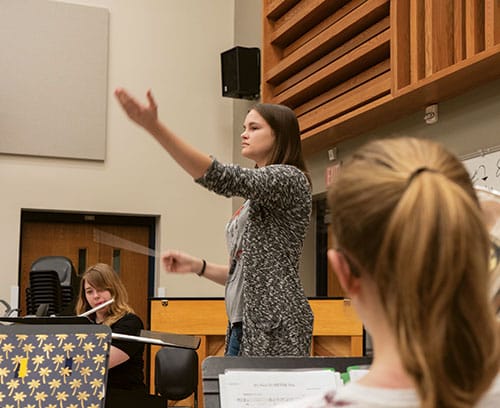As someone who works regularly with undergraduate music students, I frequently have discussions with individuals about their future plans and professional goals. Where do they see themselves in the next five, ten, or even twenty years? These plans often include graduate study, such as a master’s degree or doctoral degree in music education, music performance, conducting, or musicology. In our conversations, I have found that many students do not consider important factors when deciding if a graduate program is a good fit. While this list is not definitive, here are some items that I bring up with students.

Courtesy of Lebanon Valley College
Why do you want to pursue a graduate degree?
• Do you want to continue your education or increase the depth and focus of your teaching or performance?
• Do you need to fulfill a requirement for recertification in your school district or state, or do you want to become certified in a specialized area?
• Is professional advancement your goal, either in the grade level you teach or your employer’s pay scale?
• Do you seek a different career path in music?
When would you like to pursue a degree?
Depending on your goals, the best time to continue your education might be right after earning an undergraduate degree. For example, if you are pursuing a graduate degree in music performance, music theory, musicology, or composition, the time to continue your education may be after completing your undergraduate study when your performance ability is at its height, and you desire to keep pushing yourself.
For other degrees, such as a graduate degree in music education, obtaining a few years of professional experience first may prove beneficial. This will help you develop classroom skills and collect evidence of your teaching abilities. Documentation to gather may include recordings from the classroom and conducting rehearsals, teaching materials and handbooks you have created, concert programs, formal evaluations, newspaper articles, or photographs of your students in action. This will not only help you in the application process, but when you begin the degree program, you will have a more extensive understanding and set of experiences to draw from than someone with only their undergraduate field experiences and student teaching.
Where would you like to study?
Start by making a list of schools. you are interested in. These universities might be on the list due to the program location and professional opportunities available to graduate students, including working with a highly regarded teacher. Depending on your familiarity with the school, a visit can help decide which programs make the cut. You may discover that the location is wonderful and opportunities to perform with local ensembles or teach private lessons are plentiful. You may also learn that the school or music department is an unsafe area, or the cost of living makes pursuing a graduate degree there less attractive.
If a particular faculty member is a key reason why you are considering a school, consider how well you might work that person. The relationship with your major professor in graduate school will be one of the most important professional relationships you will develop. You want to make to sure that you will thrive by spending years under their guidance. It can help to meet and learn about them before you audition or interview. One way is to attend professional development sessions, masterclasses, or workshops where they are teaching or presenting. You can also contact faculty members to schedule a lesson to see if their teaching style works for you and if they will continue to cultivate and nourish your musical and pedagogical abilities.
Establishing a relationship with a faculty member may also influence the timing of graduate study. Some programs can only admit or offer financial aid to a limited number of students in a given year, and the demand for a certain faculty member may prevent you from being admitted right away. However, by waiting a year or for the completion of a graduate cohort, you could be admitted or given a scholarship offer in the next year or cycle.
What is your goal at the end of the degree program?
A significant objective of completing a graduate program is career advancement. Some students want a more advanced teaching position, either in a different role or a better setting. Some graduate students want to jump from teaching at the K-12 level to the university level. Others want to perform with a professional ensemble or work in the office for a professional ensemble or non-profit organization. Regardless of your plans, examine whether the program or degree will help you achieve your goals. Where do graduates of the program work after completing their degrees? Where are they living and working, and how much did the school or faculty help them get there? It may be prudent to contact an alum to get their thoughts on the program or faculty member.
What are the requirements to apply and audition?
Once you have decided on which programs you want to apply to, make a list of the application and audition requirements and deadlines for each one. Items to include might be:
• What is the grade point average requirement from your undergraduate study?
• Do you need to take any additional exams, such as the Graduate Record Examination (GRE)?
• Is there a preference or requirement for years and types of prior experience?
• Do you need to submit pre-screening materials, such as recordings or video from solo and ensemble performances, teaching, rehearsals, etc?
• What are the fees for the application or pre-screening?
• When are the audition/interview dates for the program, or do you need to schedule an individual appointment?
How are you going to fund a graduate degree?
Some schools offer graduate students a full-time assistant position, including a scholarship or tuition waiver as well as a stipend for working a particular number of hours a week. Scholarships or tuition waivers can cover anything up to the full cost of tuition and possibly general fees from the university. Some universities may also offer a discounted rate or cover the cost of health insurance as part of the financial package for graduate assistants. If you are offered a stipend, the amount may vary depending on your duties and the expected hours per week you are working as a graduate assistant.
Graduate assistants often help with or teach undergraduate courses. They may also assist with rehearsals and performances, or complete administrative tasks including grading, record keeping, and faculty research projects. There may be an assistantship that includes tracking and maintaining the university instrument inventory. Other assistants might work in the music library, technology lab, or recording studio. With the rise of social media and performance live-streaming, more programs offer assistantships handling public relations and media outreach. What-ever tasks a position might entail, know the facts before you sign a contract. Always look for the fine print: “Other duties as assigned.”
Some schools and programs allow students to attend graduate school while maintaining a full-time job, completing coursework part time over a few years or through summers-only or online degree programs. These students are typically not graduate assistants but may receive financial assistance or reimbursement from their employer or a scholarship program while completing their degrees.
However you choose to complete your graduate degree, carefully assess whether you can afford the full expense of graduate school. Consider moving costs as well as essentials like rent, food, utilities, and transportation. How will you pay for unexpected expenses such as home repairs, vehicle breakdowns, and medical procedures? Will you be able to afford health and dental insurance, car insurance, and renter’s insurance? You may need to evaluate whether you will have time for an additional part-time job or will require financial assistance through student or personal loans. This may involve conversations with family members or financial experts so you have a firm grasp of your financial obligations during and after completing the degree.
Another important factor to consider is whether the return for your time and the expense of graduate school is worth it for you and your career plans. Make sure to do thorough research and know what you are committing to before making such a large investment in your educational and professional life.





